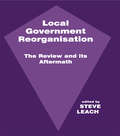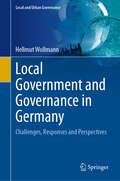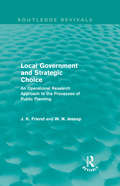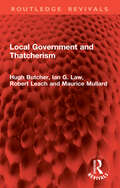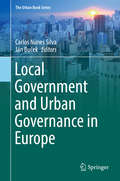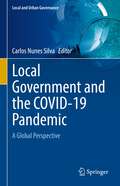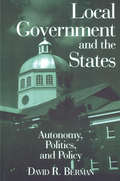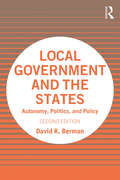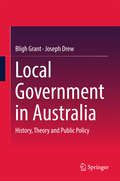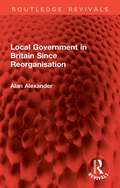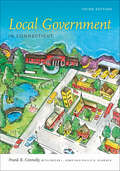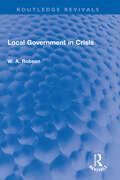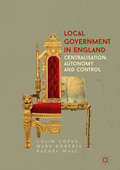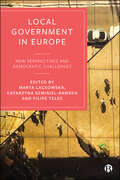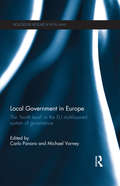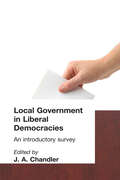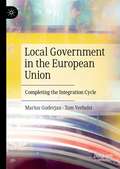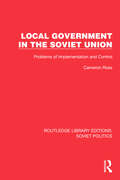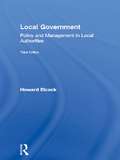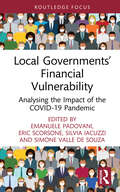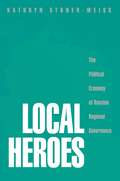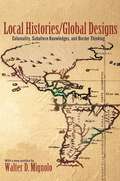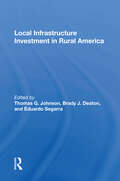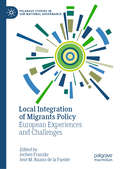- Table View
- List View
Local Government Reorganisation: The Review and its Aftermath
by Steve LeachThe Local Government Review raised issues of political process and decision-making theories. The interest lies in the insights provided by academic analysis, and the highlighting of the lessons to be learned. This volume attempts to respond to both these perspectives.
Local Government and Governance in Germany: Challenges, Responses and Perspectives (Local and Urban Governance)
by Hellmut WollmannThe book aims at outlining key political, functional, administrative and financial features of Germany’s local government system and at placing them in a (European) comparative perspective. In pursuing an “institutionalist” approach it focuses on discussing whether, how and why the position and activities of local government in the intergovernmental (“multi-level”) setting have changed vis-à-vis multiple challenges and crises. Among the latter tasks such as coping with the energy crisis, the influx of asylum seekers and refugees, the digitization of local administration and the Covid19 pandemic loom large. Ranking among the functionally and politically strongest among European countries Germany’s local government plays an important role in the German federal system and beyond in the European Union. Over the years it has proved a remarkable problem solving and innovative capacity. Hence, the German case may attract the attention of a European and international audience interested in local government and governance and practices.
Local Government and Strategic Choice: An Operational Research Approach to the Processes of Public Planning (Routledge Revivals)
by John Friend Neil JessopFirst published in 1969, this book is concerned with the processes of policy-making in local government. The authors address themselves to the basic challenge of planning in a democracy and consider issues such as how those elected to exercise choice on our behalf can preserve and expand their capacity to choose discriminatingly, when the sheer complexity of the issues facing them tends all the time to make them increasingly dependent on the skills and judgements of their professional advisers. This question is explored in relation to the many different, yet interdependent, aspects of the planning process which impinge on any local community – with particular reference to the planning of housing, transport, education, and shopping, of land use and local government finance. The book is the outcome of a four-year program of research during which a mixed team of operational research and social scientists was given a unique opportunity to observe the ways in which decisions were made and plans formulated in one particular city- Coventry. It covers both political and professional aspects of local government in 1960s Great Britain and has had important implications for urban governments throughout the world.
Local Government and Thatcherism (Routledge Revivals)
by Robert Leach Maurice Mullard Hugh Butcher Ian G. LawThe 1980s witnessed an unprecedented series of initiatives aimed at transforming the role and manner of local government operations in Britain. First published in 1990, Local Government and Thatcherism provides a clear and up-to-date framework for understanding the impact of ‘Thatcherism’ on local government during this period and explores future prospects.The authors examine the effect of the ‘Thatcher Revolution’ on the policy and practice of local government, looking at the role of ideology in key policy areas such as finance, public services, local economic development, race, and decentralization. Beginning with an analysis of the evolution of local government, the authors situate Thatcherism in the context of ‘Municipal Toryism’, and discuss changes in local finance, including the introduction of the community charge. They focus on changes in public policy, particularly innovations like grant-maintained schools and Housing Action Trusts and look in detail at economic regeneration and equal opportunities, two areas in local policy development which are increasingly under threat from centralizing tendencies. The authors conclude that the revolution in local government is aimed at nothing less than recasting the local socio-political order and political process. Coming to terms with these challenges, they believe, will change the face of local government in 1990s; the contract authority, the enterprising authority, and the business-corporatist authority.Lucid and stimulating, this discussion will be invaluable to students of British politics, and public and social administration, and to all those who wish to know more about the future of local government.
Local Government and Urban Governance in Europe
by Ján Buček Carlos Nunes SilvaThis book discusses innovative responses and reforms developed in critical areas of urban governance in European countries. It examines the impact of European Union's policies on the urban agenda and on local governance, and the impact of the transition to democracy in Central and in Southern Europe on local self-government systems. The book is divided into three parts: i) Crisis, Reform and Innovation in Local Government; ii) EU Policies, the Urban Agenda and Local Governance; and iii) Citizen Participation in Local Government. Providing an extensive and updated overview of key challenges in the governance of cities in Europe, the book will be of interest to students and researchers in the broader field of urban studies, and for policy-makers, especially those engaged in urban governance in European countries.
Local Government and the COVID-19 Pandemic: A Global Perspective (Local and Urban Governance)
by Carlos Nunes SilvaThe book provides a global perspective of local government response towards the COVID-19 pandemic through the analysis of a sample of countries in all continents. It examines the responses of local government, as well as the responses local government developed in articulation with other tiers of government and with civil society organizations, and explores the social, economic and policy impacts of the pandemic. The book offers an innovative contribution on the role of local government during the pandemic and discusses lessons for the future. The COVID-19 pandemic had a global impact on public health, in the well-being of citizens, in the economy, on civic life, in the provision of public services, and in the governance of cities and other human settlements, although in an uneven form across countries, cities and local communities. Cities and local governments have been acting decisively to apply the policy measures defined at national level to the specific local conditions. COVID-19 has exposed the inadequacy of the crisis response infrastructures and policies at both national and local levels in these countries as well as in many others across the world. But it also exposed much broader and deeper weaknesses that result from how societies are organized, namely the insecure life a substantial proportion of citizens have, as a result of economic and social policies followed in previous decades, which accentuated the impacts of the lockdown measures on employment, income, housing, among a myriad of other social dimensions. Besides the analysis of how governments, and local government, responded to the public health issues raised by the spread of the virus, the book deals also with the diversity of responses local governments have adopted and implemented in the countries, regions, cities and metropolitan areas. The analysis of these policy responses indicates that previously unthinkable policies can surprisingly be implemented at both national and local levels.
Local Government and the States: Autonomy, Politics and Policy
by David BermanThis book offers an overview of the legal, political, and broad intergovernmental environment in which relations between local and state units of government take place, the historical roots of the conflict among them, and an analysis of contemporary problems concerning local authority, local revenues, state interventions and takeovers, and the restructuring of local governments. The author pays special attention to local governmental autonomy and the goals and activities of local officials as they seek to secure resources, fend off regulations and interventions, and fight for survival as independent units. He looks at the intergovernmental struggle from the bottom up, but in the process examines a variety of political activities at the state level and the development and effects of several state policies. Berman finds considerable reason to be concerned about the viability and future of meaningful local government.
Local Government and the States: Autonomy, Politics, and Policy
by David R. BermanThis book offers an overview of the legal, political, and broad intergovernmental environment in which relations between local and state units of government take place, the historical roots of the conflict among them, and an analysis of contemporary problems concerning local authority, local revenues, state interventions and takeovers, and the restructuring of local governments. The author pays special attention to local governmental autonomy and the goals and activities of local officials as they seek to secure resources, fend off regulations and interventions, and fight for survival as independent units.Now, in a thoroughly revised second edition, this book examines marijuana use, minimum wages, the establishment of sanctuary cities, and the regulation of ride-sharing companies. Looking at the intergovernmental struggle from the bottom up, and in the process examining a variety of political activities and policies at the state level, Berman finds considerable reason to be concerned about the viability and future of meaningful local government. This book improves our understanding of the relationship between state and local governments. It provides a thoughtful look at the past, present, and possibly the future of local home rule.
Local Government in Australia
by Bligh Grant Joseph DrewThis book offers a general introduction to and analysis of the history, theory and public policy of Australian local government systems. Conceived in an international comparative context and primarily from within the discipline of political studies, it also incorporates elements of economics and public administration. Existing research tends to conceptualise Australian local government as an element of public policy grounded in an 'administrative science' approach. A feature of this approach is that generally normative considerations form only a latent element of the discussions, which is invariably anchored in debates about institutional design rather than the normative defensibility of local government. The book addresses this point by providing an account of the terrain of theoretical debate alongside salient themes in public policy.
Local Government in Britain Since Reorganisation (Routledge Revivals)
by Alan AlexanderOriginally published in 1982, this book was the first comprehensive, critical assessment of the outcome of the controversial reorganisation of British local government outside London which took place between 1973 and 1975. The book deals with the new systems in England, Wales and Scotland, drawing upon the results of almost 100 in-depth interviews with leading members and officers from Shetland to Cornwall, from major cities to rural districts. Liaison between the tiers, the effects of corporate management, the spread of the office of chief executive, the increasing levels of partisanship and the changing face of central-local relations are examined on the basis of close observation and practical experience rather than theoretical preconceptions.
Local Government in Connecticut (The Driftless Connecticut Series)
by Frank B. Connolly Rob Schenck Roger L KempOriginally published in 1992 and revised in 2001, Frank B. Connolly's Local Government in Connecticut is one of the most useful and well-established resources on the state's local government. Written expressly for public officials and students, the book explains Connecticut's basic forms of local government and its many variants, as well as examining their inner workings, including governance, management, administration, municipal services, education, and land use. This new edition has been entirely revised, expanded, and updated, with new chapters on charter revision, municipal employees and unionization, education, homeland security and local government, pensions, and economic development. It includes references to key sections of the Connecticut General Statutes. This unique and indispensable resource for the state is published in cooperation with the Connecticut Conference of Municipalities.
Local Government in Crisis (Routledge Revivals)
by W. A. RobsonFirst published in 1966, Local Government in Crisis presents a comprehensive overview of the challenges and limitations of the local government in Britain. William A. Robson discusses major themes like loss of municipal functions and public utilities; transfer of powers from county districts to county councils; increased central control and dependence on central finance; attitude of local authorities to municipal reforms; the Local Government Act, 1958; and work of the Local Government Commission, to showcase the demand for far reaching substantial changes in a) the structure and finance of local government, b) the relations of local authorities with central departments and c) the power entrusted to local councils. This book is an essential read for scholars and researchers of public administration, political science, and public policy.
Local Government in England
by Mark Roberts Colin Copus Rachel WallThe book explores the claim that English local government exists in one of the most centralised relationships with national government. Such a position fundamentally undermines any notion of local self-government and makes the term 'government' in local government a misnomer. The book will examine how the erosion of the autonomy, powers, roles, functions and responsibilities of English local government came about, the arguments of centralisers and localisers to support their view of the constitutional status of local government, and its overall role in the government of England. The book offers an antidote to the onward march of centralisation by offering a new vision of local government which emphasises both 'local' and 'government'.
Local Government in Europe: New Perspectives and Democratic Challenges
by Marta Lackowska, Katarzyna Szmigiel-Rawska and Filipe TelesDrawing on classical and emerging research perspectives, this comprehensive book provides an up-to-date review of local government in Europe. Featuring an impressive range of contributors from both eastern and western Europe, the book addresses three main topics: territorial reforms, democratic empowerment of citizens and the role of local leadership, as well as new trends in local finances. Acknowledging their inherent diversity, the book examines the ways that local governments have responded to shared challenges, such as climate change, increasing populism and democratic deficit in order to identify both the variety and communalities between the country-specific features. In doing so, it provides a rich picture of the latest trends in local government, as well as pointing the way for future developments.
Local Government in Europe: The ‘Fourth Level’ in the EU Multi-Layered System of Governance (Routledge Research in EU Law)
by Carlo Panara Michael VarneyThis work considers the role of local government in 13 EU Member States (Austria, Belgium, Czech Republic, France, Germany, Greece, Hungary, Italy, Netherlands, Poland, Spain, Sweden and the United Kingdom. The book aims to provide an account of the system of local government in each of the countries studied along with a critical and contextual approach to the level of autonomy that local government enjoys. The approach is comparative, based on a questionnaire which all of the authors considered. There is then a detailed conclusion to the book which offers a detailed summary and comparative analysis of the responses in order to better consider the role of local authorities as the ‘fourth level’ of governance in the EU. The book aims to offer a detailed introduction to and account of each system of local government which may appeal to those seeking an overview of the area, but also a critical and contextual approach that will be of interest to those actively researching in the areas of local and regional government or EU-central-local government relations. The book contains details of reform in local government up to November 2012, including an analysis of the impact of austerity measures on local autonomy where these have become significant.
Local Government in Liberal Democracies: An Introductory Survey
by J. A. ChandlerThe quality and nature of local government varies widely between countries. This introductory text looks at the workings of local government in England and Wales, Germany, France, Ireland, Italy, Sweden, Canada and the USA. The chapters have a similar format so the student has a framework for systematic comparisons of the different case studies and a comprehensive conclusion summarises major differences and relationships between the structures studied.
Local Government in the European Union: Completing the Integration Cycle
by Marius Guderjan Tom VerhelstThis book addresses the ‘bigger picture’ of local-European relations and adds a new dimension to existing studies on multilevel governance and the Europeanisation of local government. Drawing from a combination of European integration theories and operational approaches, it introduces the idea of an integration cycle in which local government responds to the top-down impact of the EU internally, horizontally and vertically. This volume presents a wide range of empirical examples to demonstrate how local authorities across Europe have changed their practices, orientation and preferences, and adapted their institutions and organisation. Not only do cities, towns and counties cooperate with each other across borders and through transnational networks and partnerships, but by mobilising formally and informally, local actors participate in and influence European governance and contribute to the future trajectories of European integration, thereby completing the integration cycle.
Local Government in the Soviet Union: Problems of Implementation and Control (Routledge Library Editions: Soviet Politics)
by Cameron RossLocal Government in the Soviet Union (1987) analyses the Soviet Union’s limited success in improving local government between in the 1960s to 1980s, as the country made a drive toward centralized policy control. It examines the institutional framework and changes in crucial policy areas, and argues that a fragmented vertical power structure involving the three bureaucracies of Party, ministries and the city and regional soviets was unproductive. It shows how group interests moulded and adapted policies and how the Party’s initiative in centralizing policy was thwarted. It also outlines the significance of the industrial base in determining local budgets and the provision of amenities, as opposed to overtly political factors.
Local Government: Policy and Management in Local Authorities
by Howard ElcockSince first publication in 1982, Howard Elcock's Local Government has established a reputation as a comprehensive and unbiased account of how British local government really works. This respected textbook has been completely revised and rewritten for its third edition, to take account of changes in local government and in the circumstances in which it operates. The third edition examines new management structures and accountabilities that follow the policy initiatives of the central Conservative administration. It appraises the impact of the three-pronged reform of the Thatcher years: impact on local authorities' financial resources, new structures of local government and new pressure to contract services out to the private and voluntary sectors.
Local Governments’ Financial Vulnerability: Analysing the Impact of the Covid-19 Pandemic (Routledge Research in Urban Politics and Policy)
by Emanuele PadovaniLocal Governments’ Financial Vulnerability presents a conceptual framework developed to examine how vulnerable local finances were before and in the immediate aftermath of the Covid-19 pandemic crisis by mapping and systematising its dimensions and sources. The model is then applied to eight countries with different administrative models and traditions: Australia, Austria, Bosnia and Herzegovina, Germany, Italy, Portugal, Spain, and the USA. Comparative results reveal not only that Covid-19 impacts and policy tools had a lot of similarities across countries, but also that financial vulnerability has an inherently contingent nature in time and space and can lead to paradoxical outcomes. The book shows that the impact of the crisis on local governments’ finances has been postponed and that financial vulnerability is expected to increase dramatically for a few years following the pandemic, especially in larger and richer municipalities which are traditionally more autonomous and less financially vulnerable. The authors provide timely insights and analytical tools that can be useful for both academic and public policy purposes, to further appreciate local governments’ financial vulnerability, especially during crises. This book is a valuable resource for practitioners and academics, as well as students of public policy, public management, financial management, and public accounting. Local governments can use the framework to better appreciate and manage their financial vulnerability, while oversight authorities can use it to help local governments become less financially vulnerable or, at least, more aware of their financial vulnerability. Financial institutions, advisors, and rating agencies may use this publication to refine or revise their models of credit risk assessment.
Local Heroes: The Political Economy of Russian Regional Governance
by Kathryn Stoner-WeissIn Local Heroes, Kathryn Stoner-Weiss analyzes a crucial aspect of one of the great dramas of modern times--the reconstitution of the Russian polity and economy after more than seventy years of communist rule. This is the first book to look comprehensively and systematically at Russia's democratic transition at the local level. Its goal is to explain why some of the new political institutions in the Russian provinces weathered the monumental changes of the early 1990s better than others. Using newly available economic, political, and sociological data to test various theories of democratization and institutional performance, Stoner-Weiss finds that traditional theories are unable to explain variations in regional government performance in Russia. Local Heroes argues that the legacy of the former economic system influenced the operation of new political institutions in important and often unexpected ways. Past institutional structures, specifically the concentration of the regional economy, promoted the formation of political and economic coalitions within a new proto-democratic institutional framework. These coalitions have had positive effects on governmental performance. For democratic theorists, this may be a surprising conclusion. However, it is possible, as Stoner-Weiss suggests, that the needs of democratic development may be different in the short run than in the long run. The "local heroes" of today may be impediments to the further development of democracy tomorrow. This provocative work, solidly grounded in research and theory, will interest anyone concerned with issues of economic and political transition.
Local Histories/Global Designs: Coloniality, Subaltern Knowledges, and Border Thinking (Princeton Studies in Culture/Power/History)
by Walter D. MignoloLocal Histories/Global Designs is an extended argument about the "coloniality" of power by one of the most innovative Latin American and Latino scholars. In a shrinking world where sharp dichotomies, such as East/West and developing/developed, blur and shift, Walter Mignolo points to the inadequacy of current practices in the social sciences and area studies. He explores the crucial notion of "colonial difference" in the study of the modern colonial world and traces the emergence of an epistemic shift, which he calls "border thinking." Further, he expands the horizons of those debates already under way in postcolonial studies of Asia and Africa by dwelling in the genealogy of thoughts of South/Central America, the Caribbean, and Latino/as in the United States. His concept of "border gnosis," or sensing and knowing by dwelling in imperial/colonial borderlands, counters the tendency of occidentalist perspectives to manage, and thus limit, understanding. In a new preface that discusses Local Histories/Global Designs as a dialogue with Hegel's Philosophy of History, Mignolo connects his argument with the unfolding of history in the first decade of the twenty-first century.
Local Housing Market Cycle and Loss Given Default: Evidence from Sub-Prime Residential Mortgages
by Yanan Zhang Lu Ji Fei LiuA report from the International Monetary Fund.
Local Infrastructure Investment In Rural America
by Thomas G. Johnson Brady J. Deaton Eduardo SegarraOriginally published in 1988, this is a collection of symposium papers examining the link between public infrastructure and economic growth. Subjects covered include Economic theories of infrastructure Decision-making, Issues in the supply of Public infrastructure, Life cycle behaviour and the demand for infrastructure, limitations, financial sources and budgeting, the role of the local and federal government, different models and case studies in South Carolina, North Dakota, and the Pennsylvania Agricultural Access Program
Local Integration of Migrants Policy: European Experiences and Challenges (Palgrave Studies in Sub-National Governance)
by Jochen Franzke José M. Ruano de la FuenteThis book presents an overview of European migration policy and the various institutional arrangements within and between various actors, such as local councils, local media, local economies, and local civil society initiatives. Both the role of local authorities in this policy field and their cooperation with civil society initiatives or networks are under-explored topics for research. In response, this book provides a range of detailed case studies focusing on the six main groups of national and administrative traditions in Europe: Germanic, Scandinavian, Napoleonic, Southeastern European, Central-Eastern European and Anglo-Saxon.
